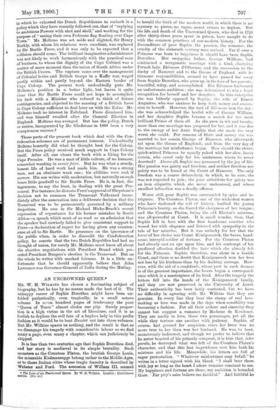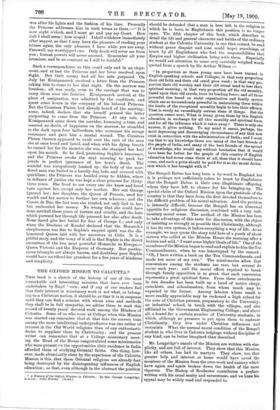AN UNCROWNED QUEEN.* MR. W. H. WristrNs has chosen a
fascinating subject of biography, but he has by no means made the best of it. The unhappy career of Sophie Dorothea might have been un- folded pathetically, even tragically, in a small octavo volume. In seven hundred pages of irrelevancy the poor "Queen of Tears" almost eludes our pity. Surely propor- tion is a high virtue in the art of literature, and it is as foolish to deplore the evil fate of a hapless lady in this prolix fashion as it would be to beat Hamlet out into three volumes. But Mr. Wilkins spares us nothing, and the result is that as we disengage his tragedy with considerable labour so we find many a page, even many a chapter, which can judiciously be skipped.
It is less than two centuries ago that Sophie Dorothea died, and her story is mediteval in its simple • brutality. Such monsters as the Countess Platen, the brutish George Louis, the miserable Kielmansegge belong rather to the Middle Ages, or to those Italian cities whose tragic ferocity is described by Webster and Ford. The accession of William Di seemed
• i'ies LOW of an rawrownes Own. By W. H. Wilkins. London : Hutchinson andOck L5s. &Li to herald the birth of the modern world, in which there is no mystery to pierce, no vague, secret crimes to deplore. But the life and death of the Uncrowned Queen, who died in 1726 after thirty-three years spent in prison, have naught to do with the common practices of our modern history. For the discomfiture of poor Sophie the passion, the romance, the cruelty of the sixteenth century were revived. Yet if ever a Princess was born to happiness it should have been Sophie Dorothea. Her easygoing father, George William, had contracted a morganatic marriage with a kind, charming French lady, Eleonore d'Olbreuse, and the succession to the duchy of Hanover and to the throne of England, with its tiresome responsibilities, seemed to have passed far away from Sophie Dorothea, who grew up, in the love of her parents. beautiful, witty, and accomplished. But Eleonore harboured an unfortunate ambition : she was determined to win a legal recognition for herself and her daughter. In this enterprise she was bitterly opposed by Sophia, the wife of Ernest Augustus, who was anxious to keep both money and succes- sion to herself. However, the tact of Eleonore won the day ; she was acknowledged the lawful wife of George William, and her daughter Sophie became a match for the most brilliant Prince of them all. As she grew in wit and beauty, more than one marriage was proposed for her, and it was due to the energy of her Aunt Sophia that she made the very worst she could. For reasons of State and money she was married to her cousin George of Hanover, who afterwards sat upon the throne of England; and from the very day of the marriage her misfortunes began. How should the clever, quick-witted Princess be equally yoked with her slow, heavy cousin, who cared only for his mistresses, whom he never deserted P Above all, Sophie was possessed by the joy of life. Her passion was gaiety and freedom, and neither freedom nor gaiety was to be found at the Court of Hanover. The only freedom was a coarse debauchery, in which, to be sure, she was not expected to join; the poor substitute for gaiety was an iron etiquette, which she never understood, and whose smallest infraction was a deadly offence.
Worse still, poor Sophie was surrounded by spies and in- triguers. The Countess Platen, one of the wickedest women who have darkened the roll of history, loathed the young Princess's beauty, as she feared the sharpness of her tongue ; and the Countess Platen, being the old Elector's mistress, was all-powerful at Court. It is small wonder, then, that Sophie fell in love with the first handsome courtier who wooed her with elegance and listened with sympathy to the tale of her miseries. But it was unlucky for her that the lover of her choice was Count Konigsmarck, the brave, hand- some, intrepid soldier of fortune. For the Countess Platen had already cast an eye upon him, and his contempt of hei proffered affection doubled the hate which she already felt for the Princess. Sophie, therefore, was alone in a hostile Court, and there is no doubt that Konigsmarck won her love not less by his kindness than by his dashing courage. How- ever, with the aid of a confidante, whose part in such dramas is of the greatest importance, the lovers began a correspond- ence which is a masterpiece of its kind. After the tragedy the letters fell into the hands of the Konigsmarck family, and they are now preserved in the University of Lund. Their authenticity has been hotly contested, but we have no difficulty in agreeing with Mr. Wilkins that they are genuine. In every line they bear the stamp of real love- making as love was made in the days when sensibility was becoming a fashion. For all their ardour and sincerity they cannot but suggest a romance by Madame de Kradener. They are madly in love, these two personages, yet all the while they torture one another with jealousy. Sophie, of course, had ground for suspicion, since her lover was no more true to her than was her husband. He was, to boot, monstrously indiscreet, and though we prefer to believe that he never boasted of his princely conquest, it is true that, inter pocala, he destroyed what was left of the Countess Platen's character, and that this last imprudence cost him both his mistress and his life. Meanwhile, his letters are full of. eager protestation. "Whatever misfortunes may befall," he writes in a letter signed with his blood, "I shall bear them with joy so long as the heart I adore remains constant to me. My happiness and fortune are there, my ambition is bounded there. For pity's sake believe me faithfuL" And faithful he
was after his lights and the fashion of his time. Presently the Princess addresses him in such terms as these :—" It is now eight o'clock, and I must go and pay my Court. How dull I shall seem ! how stupid ! I shall withdraw immediately after supper, so that I may have the pleasure of reading your letters again, the only pleasure I have while you are away. Farewell, my worshipped one. Only death will sever me from you ; human powers will never succeed. Remember all your promises, and be as constant as I will be faithful."
Such a correspondence as this could only end in an elope- ment, and at last the Princess and her lover resolved upon flight. But their enemy had all her nets prepared. On July 1st Konigsmarck received a letter from the Princess asking him to come to her that night. On the morrow was freedom ; all was ready, even to the carriage that was to carry them over the frontier. Konigsmarck arrived at the place of assignation, was admitted by the confidante, and spent some hours in the company of his beloved Princess. But the Countess Platen had already heard of the meeting; some, indeed, declare that she herself penned the letter purporting to come from the Princess. At any rate, as Konigsmarck came down the corridor, humming a tune, and assured, no doubt, of happiness on the morrow, he stumbled in the dark upon four halberdiers, who overcame his savage resistance and gave him a mortal wound. The Countess Platen thereon appeared to exult over the ruin of the man she at once loved and hated, and when with his dying breath he cursed her for the monster she was, she stamped her heel upon his mouth. So he died, protesting Sophie's innocence, and the Princess awoke the next morning to pack her jewels in perfect ignorance of her hero's death. The scandal was scrupulously hushed up ; the body of the mur- dered man was buried in a hastily dug hole, and covered with quicklime ; the Princess was hustled away to Ahlden, where in defiance of justice she was kept a close prisoner for thirty- three years. She lived to see every one she knew and loved turn against her, except only her mother. Her son George ignored her; her daughter, the Queen of Prussia, used her wealth and her sorrow to further her own schemes ; and the Comte de Bar, the last man she trusted, not only lied to her, but embezzled her money. No wrong that she could have done merited these years of torture and cruelty, and the hate which pursued her through life pursued her also after death. None dared give her burial for fear of George I.; and only when the Duchess of Kendal declared that the Monarch's sleeplessness was due to Sophie's unquiet spirit was the dis- honoured Queen laid with her ancestors at Celle. It is a pitiful story, and the irony of it all is that Sophie is the direct ancestress of the two most powerful Monarchs in Europe,— Queen Victoria and the Emperor of Germany. But posthu- mous triumphs are always barren, and doubtless poor Sophie would have sacrificed her grandeur for a few years of kindness and simplicity.







































 Previous page
Previous page